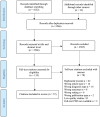Structural stigma and its impact on healthcare for borderline personality disorder: a scoping review
- PMID: 36175958
- PMCID: PMC9520817
- DOI: 10.1186/s13033-022-00558-3
Structural stigma and its impact on healthcare for borderline personality disorder: a scoping review
Abstract
Background: People with Borderline Personality Disorder (BPD) and their carers/families continue to experience structural stigma when accessing health services. Structural stigma involves societal-level conditions, cultural norms, and organizational policies that inhibit the opportunities, resources, and wellbeing of people living with attributes that are the object of stigma. BPD is a serious mental illness characterized by pervasive psychosocial dysfunction including, problems regulating emotions and suicidality. This scoping review aimed to identify, map, and explore the international literature on structural stigma associated with BPD and its impact on healthcare for consumers with BPD, their carers/families, and health practitioners.
Methods: A comprehensive search of the literature encompassed MEDLINE, CINAHL, PsycINFO, Scopus, Cochrane Library, and JBI Evidence-Based databases (from inception to February 28th 2022). The search strategy also included grey literature searches and handsearching the references of included studies. Eligibility criteria included citations relevant to structural stigma associated with BPD and health and crisis care services. Quality appraisal of included citations were completed using the Mixed Methods Appraisal Tool 2018 version (MMAT v.18), the Joanna Briggs Institute (JBI) Checklist for Systematic Reviews and Research Syntheses Tool, and the AGREE II: advancing guideline development, reporting, and evaluation in health care tool. Thematic Analysis was used to inform data extraction, analysis, interpretation, and synthesis of the data.
Results: A total of 57 citations were included in the review comprising empirical peer-reviewed articles (n = 55), and reports (n = 2). Studies included quantitative, qualitative, mixed methods, and systematic review designs. Review findings identified several extant macro- and micro-level structural mechanisms, challenges, and barriers contributing to BPD-related stigma in health systems. These structural factors have a substantial impact on health service access and care for BPD. Key themes that emerged from the data comprised: structural stigma and the BPD diagnosis and BPD-related stigma surrounding health and crisis care services.
Conclusion: Narrative synthesis of the findings provide evidence about the impact of structural stigma on healthcare for BPD. It is anticipated that results of this review will inform future research, policy, and practice to address BPD-related stigma in health systems, as well as approaches for improving the delivery of responsive health services and care for consumers with BPD and their carers/families.
Review registration: Open Science Framework ( https://osf.io/bhpg4 ).
Keywords: Borderline personality disorder; Carers; Consumers; Crisis care; Families; Health practitioners; Health services; Health systems; Healthcare; Structural stigma.
© 2022. The Author(s).
Conflict of interest statement
The authors declare that they have no competing interests.
Figures
Similar articles
-
Structural stigma and its impact on healthcare for consumers with borderline personality disorder: protocol for a scoping review.Syst Rev. 2021 Jan 11;10(1):23. doi: 10.1186/s13643-021-01580-1. Syst Rev. 2021. PMID: 33423674 Free PMC article.
-
The impact of educational interventions on modifying health practitioners' attitudes and practice in treating people with borderline personality disorder: an integrative review.Syst Rev. 2022 May 30;11(1):108. doi: 10.1186/s13643-022-01960-1. Syst Rev. 2022. PMID: 35637499 Free PMC article. Review.
-
Beyond the black stump: rapid reviews of health research issues affecting regional, rural and remote Australia.Med J Aust. 2020 Dec;213 Suppl 11:S3-S32.e1. doi: 10.5694/mja2.50881. Med J Aust. 2020. PMID: 33314144
-
Consumer perspective from people with a diagnosis of Borderline Personality Disorder (BPD) on BPD management-How are the Australian NHMRC BPD guidelines faring in practice?J Psychiatr Ment Health Nurs. 2021 Aug;28(4):670-681. doi: 10.1111/jpm.12714. Epub 2020 Nov 30. J Psychiatr Ment Health Nurs. 2021. PMID: 33202081 Free PMC article.
-
Conceptual framework on barriers and facilitators to implementing perinatal mental health care and treatment for women: the MATRIx evidence synthesis.Health Soc Care Deliv Res. 2024 Jan;12(2):1-187. doi: 10.3310/KQFE0107. Health Soc Care Deliv Res. 2024. PMID: 38317290
Cited by
-
Exploring Barriers to Compassionate Acts in Individuals with Borderline Personality Disorder: A Critical Literature Review.Personal Ment Health. 2025 May;19(2):e70020. doi: 10.1002/pmh.70020. Personal Ment Health. 2025. PMID: 40242943 Free PMC article. Review.
-
Importance of investigating vulnerabilities in health and social service provision among requestors of medical assistance in dying.Lancet Reg Health Am. 2024 Jun 12;35:100810. doi: 10.1016/j.lana.2024.100810. eCollection 2024 Jul. Lancet Reg Health Am. 2024. PMID: 38974806 Free PMC article. Review. No abstract available.
-
Prevalence and Correlates of Self-Stigma in Personality Disorder Compared With Anxiety and Depression: A National Cross-Sectional Survey.Personal Ment Health. 2025 May;19(2):e70011. doi: 10.1002/pmh.70011. Personal Ment Health. 2025. PMID: 40083034 Free PMC article.
-
The societal costs of avoidant personality disorder.Personal Ment Health. 2025 Feb;19(1):e1644. doi: 10.1002/pmh.1644. Personal Ment Health. 2025. PMID: 39572388 Free PMC article.
-
Borderline in a linear city: Urban living brings borderline personality disorder to crisis through neuroplasticity-an urgent call to action.Front Psychiatry. 2025 Jan 6;15:1524531. doi: 10.3389/fpsyt.2024.1524531. eCollection 2024. Front Psychiatry. 2025. PMID: 39834579 Free PMC article. No abstract available.
References
-
- Buteau E, Dawkins K, Hoffman P. In their own words: improving services and hopefulness for families dealing with BPD. Soc Work Ment Health. 2008;6(1–2):203–214. doi: 10.1300/J200v06n01_16. - DOI
Publication types
Grants and funding
LinkOut - more resources
Full Text Sources
Other Literature Sources



